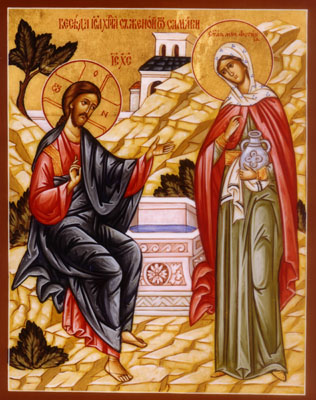|
|||
|---|---|---|---|
| This weekly bulletin insert complements the curriculum published by the Department of Christian Education of the Orthodox Church in America. This and many other Christian Education resources are available at http://dce.oca.org. | |||

The title words are from Proverbs 3: 5b. That verse begins: "Trust in the Lord with all your heart," and the following verses continue: "In all your ways acknowledge Him, and He will make straight your paths. Be not wise in your own eyes; fear the Lord, and turn away from evil. It will be healing to your flesh and refreshment to your bones." During Great Lent we read beautiful and fundamental verses in Genesis, telling us how Adam and Eve were created to be together. Genesis 2: 17 gives the story of God forming Adam from the dust of the ground and "breathing into his nostrils the breath of life" and then planting the Garden of Eden with every tree that is "pleasant to the sight and good for food." The garden is watered by four rivers. God puts Adam in the garden to till and keep it, and gives him the commandment to enjoy everything except the tree of the knowledge of good and evil. Almost as soon as He has done this, God declares that "it is not good that the man should be alone." God presents all the beasts of the field and birds of the air to Adam, who has the privilege of naming them. But among all of these there isn't found "a helper fit for him." So finally God takes Adam's own rib while he sleeps, and fashions Eve. Adam pronounces her to be that fit helper, "bone of my bone and flesh of my flesh." All this beauty and true companionship, so perfectly planned by God, still depends on the free will that God has also given to His creatures. In the very next day's reading, Adam and Eve will, as we know, undo all the good things God planned for them. How we wish they could have heeded those words from Proverbs: "Do not rely on your own insight; be not wise in your own eyes," and "Trust in the Lord with all your heart." 
Another person who needed to trust the Lord is Photini, the Samaritan Woman who meets Christ at Jacob's Well. She has many questions, but she also has patience and she doesn't rush ahead to act on her "own insight." Once she understands that Christ is the promised Messiah, she humbly becomes one of His servants as an evangelist, and does great work in spreading the Gospel. What about Adam and Eve? We know that the icon of the Resurrection will greet us at the Lenten journey's end. There on the icon they will be, the first two people, no longer outcasts from Paradise. Christ is stretching out His hand to take them to the Kingdom. |
|||
